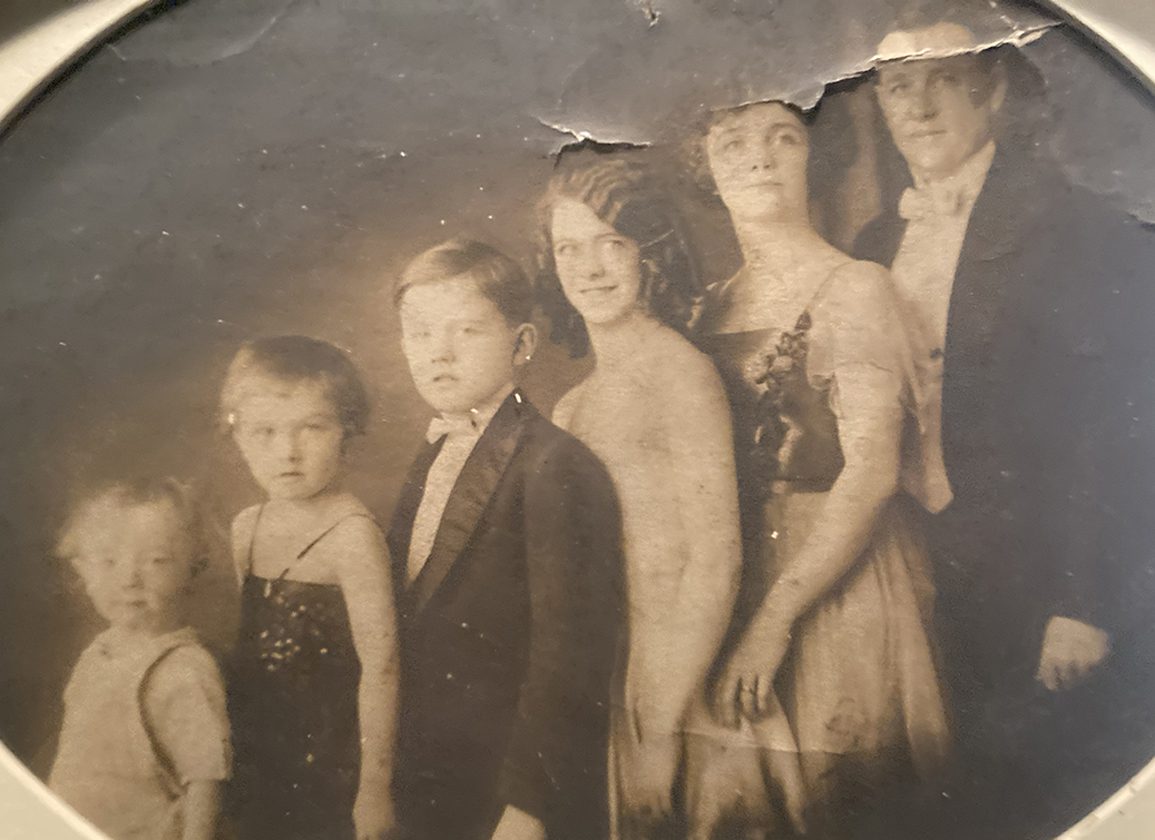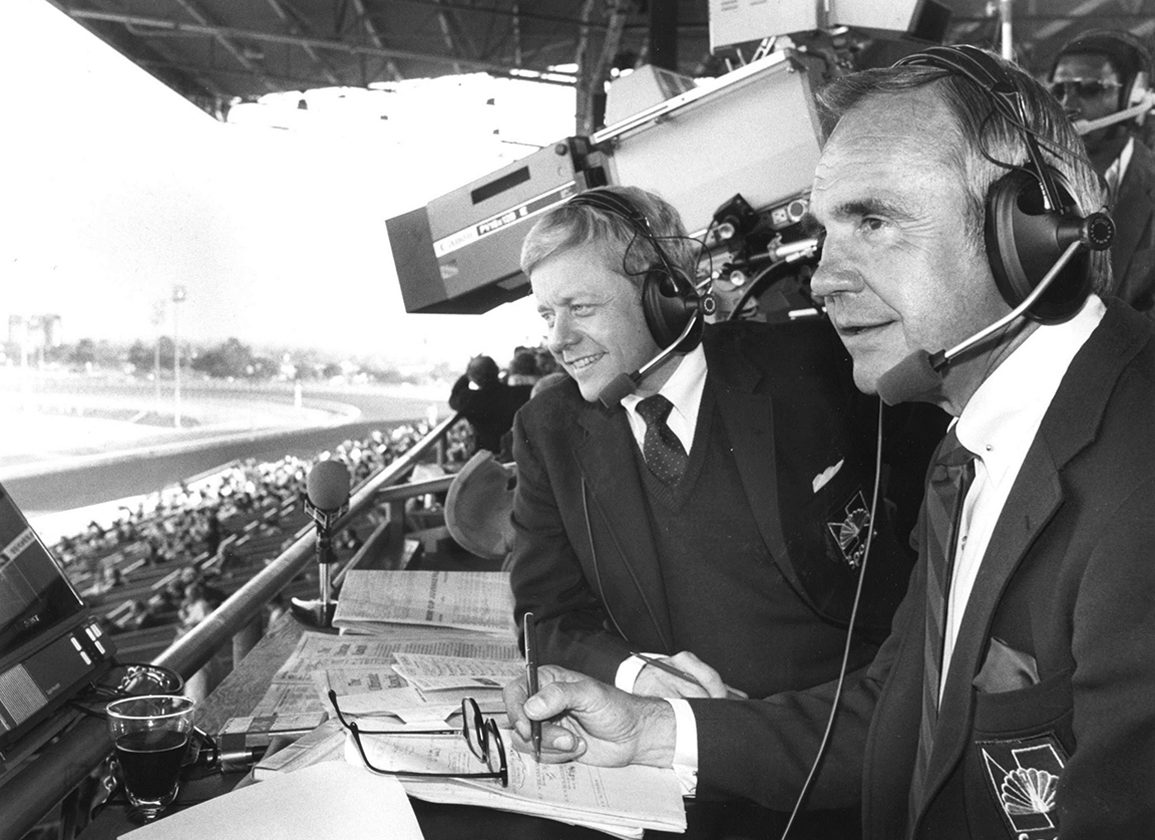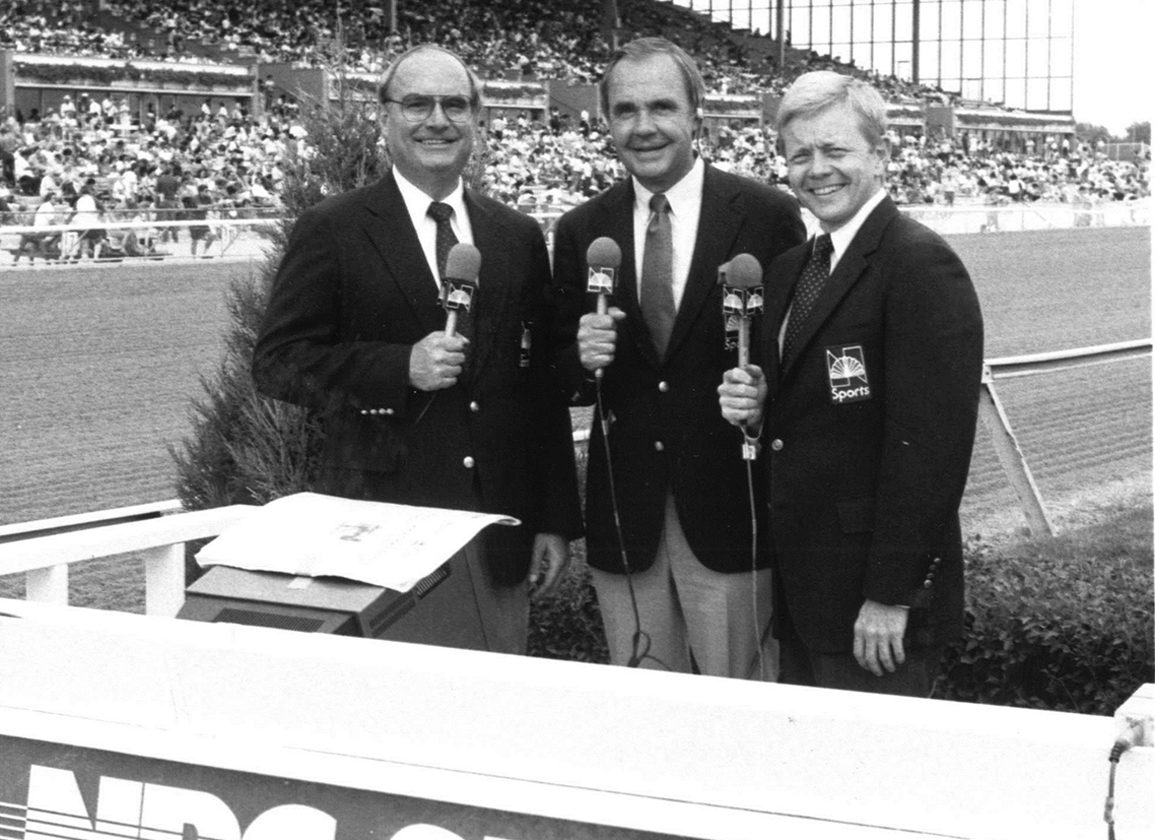Maybe our sport is still capable of bringing together four such people round a dinner table. But you have to doubt it.
“They were comparing the theaters that they had played on the Vaudeville circuit,” Dave Johnson recalls. “Which had the best backstage dressing rooms? Which had the best eating places, that you could walk to still with your costume and makeup on?”
These memories were being shared between Johnson's mother and Fred Astaire. Moreover, both of those who were listening on, fascinated, had remarkable stories of their own: Astaire's wife, the former jockey Robyn Smith, and Johnson himself-the man whose call, for those present at the 1973 Belmont S., will forever be synonymous with one of the greatest performances in the story of the breed.
Whether or not the world has moved on, it has certainly turned plenty since. Next Saturday, indeed, is the 50th anniversary of Secretariat's final start. And this dinner itself took place over 40 years ago, in Los Angeles, during Johnson's tenure as the caller at Santa Anita.
“Afterwards Fred sent my mother an autographed picture,” Johnson recalls. “I think things like that helped keep her alive. My dad died early, he was only 52. But my mother passed away at 93. I have a picture of her as a dancer in 1930, when she was nine or so, with the whole McLeod Troupe on the Orpheum Circuit: my grandfather, my grandmother, their oldest son who was an attorney, then a daughter who was in the chorus, and then my mother, and then baby Jackie, who was about four or five.”
It was a different world, clearly. His grandparents, indeed, were blackface comedians. But the timeless dividend, for Johnson, was to be raised on the stories of a nomadic community, full of incident and character; and, moreover, with a genetic flair of his own. Because it was performance, of course, that united all four of those gathered round the table at the Palm that night.

McLeod Troupe on the Orpheum Circuit: Johnson's mother is second from the left next to brother Jackie | Dave Johnson
“Robyn was much younger than Fred, but each was equally dependent on the other,” Johnson recalls. “Robyn's a wonder. She was a terrific rider, but a great person. Still is. And of course Fred was just a hell of a guy. Loved the game. He would get emotional about his horses. If one got claimed, just like Burt Bacharach, he would buy it back.
“At one point during that dinner Fred leaned across the table to me, just so serious, and I thought, 'Oh gosh, what's coming now?' And he said, 'Dave, I really have an important question to ask you.'” Johnson pauses and chuckles. “'Dave,' he said. 'How do you win the Pick Six?'”
Now here we are, on the opposite coast, in the Manhattan apartment that Johnson even then called home. (He bought it 51 years ago.) And we're wondering what has happened to our game since; how to retrieve the glamor of those days, when the golden age of the silver screen retained at least a copper glow; when Marje Everett ran Hollywood Park and made sure that friends like Elizabeth Taylor would show up for the inaugural Breeders' Cup.
Johnson knows that horseracing today is a very different world from when his mother taught him, aged just four or five, how to read the Racing Form: they were on the train from St. Louis to New Orleans, in the last months of the war, visiting his father's military posting.
“The arc of what has happened, in racing, seems so evident to me,” Johnson says. “I first started to go to the races as a very young guy. My family was never in the game as owners, trainers, anything. But we all loved to go to Fairmount Park, over the river from St. Louis, and it was always a wonderful holiday.
“In 2023, racing is a television production. There's no longer people at the track, or only very few. For the Derby, Oaks, the Breeders' Cup, Royal Ascot, a destination like Saratoga or Keeneland: yes. But on a day-to-day basis, year round, it's a television production. So what we have now, with some racing executives, is people making decisions about television without knowing anything about broadcasting. Of course, some are terrific. I've worked for good and bad; and it's no different on the TV side, some know their racing, some don't.”
At 82, naturally enough, Johnson doesn't find it quite so easy to get around. But he remains fully engaged, and feels due gratitude for precisely the reach of all the broadcasting platforms that are available today. Shortly before welcoming TDN, indeed, he had already been watching British racing on his phone over a morning coffee. But breadth of access does not equate to breadth of engagement.
One of the things that sustained the sport's popular heyday, he feels, was simply the way horses were bred or trained (or both). Johnson wonders whether longer intervals between races have partly become standard because of medication levels; less speculatively, he deplores the sensitivity of trainers to their win percentages, above all now that so many potential runners are concentrated in so few hands. Johnson remembers when even someone like Woody Stephens would have no more than 40 horses.
“I knew Woody very well, and his assistants Sandy Bruno and David Donk,” Johnson recalls. “I knew that whole barn. Wonderful people. And Lucille, Woody's wife. That was before the age of flying horses around, which was really started by Wayne Lukas. I mean, how would you begin to know 200 horses? I don't know how they do it.
“Woody was very funny. And very self-centered! 'Let's see what time it is. Oh, by the way, did I tell you that Laurel gave me this watch for winning five Selimas?' But he was a hell of a horse trainer, wasn't he? I mean, a real hardboot. Hardworking, old school. A throwback. Owners had some input, too, but the trainers ran their horses where they thought. I mean, Woody is a perfect example: winning the Met Mile with Conquistador Cielo Monday, and winning the Belmont on Saturday. I think there are some traditions which should stay, including the Triple Crown. To move the Met Mile to the Belmont undercard, that hurt me. Maybe I'm old school too.”
But maybe that's just what we're missing-the sense of participation that spreads down from the barns to the public. Horses weren't just financial or career devices, whether for breeders or trainers: they put on a show.
After all, Johnson himself would never have got started without an innate sense of theater.
“I called my first race in '65 at Cahokia Downs,” he recalls. “And it's like the script of a B movie. I was 24, working for a law firm. I'd do wills, I'd go out and take pictures of where an accident happened, I'd go and talk to a guy in prison. Anyway we had a box at the track, for the clients, and that evening I'd gone over there to wheel a horse in the double. And the announcer, Todd Creed, became ill. A stretcher went by, behind the box, and an announcement was made: 'Ladies and gentlemen, there'll be no more announcing tonight. Please watch the tote board. Thank you, and good night.'
“Now, I knew the general manager, Ann Detchemendy. She was an Ethel Merman type: a brash, wonderful lady. She'd say to me, 'Hey sweetheart, you want to split a double with me?' 'Oh yes, Miss Ann, I'd love to.' Her office was right behind, so I went in and said, 'Miss Ann, I could call the races for you. I can memorize the 10 points of the Yalta Agreement, so I can certainly manage the seven horses in this race.'”
Miss Ann picked up the phone, there was some back and forth, and she hung up. “Thanks, Dave, but the announcer's son is going to fill in.”
“That was Todd's son, Mike,” Johnson recalls. “So he's in there with the engineer, and the 'musician' who would put the stylus on the record to play the bugle. (They had to have a member of the Music Union do that for every race!) And so the three of them stood there as the horses broke out of the gate.”
“That's number five going to the lead,” says Mike.
“I don't think it's the five,” interjects the engineer.
Then a third voice: “I think it's Blue Boy.”
“And you heard the three of them argue for five furlongs,” Johnson says. “It was hilarious. Immediately after the race, Miss Ann came into the box. 'You're next!'” Johnson pauses and smiles. “I'd told my friend Tony Marino that I was going over to the track, but he was going to have some dinner first and drive over later. So he parks his car, and as he's coming through the parking lot he hears the fourth or fifth race being called. And he said, 'Geez, that sounds like Dave.'” Johnson shakes his head and chuckles. “And that was it. And here we are, almost 60 years later.”
Johnson did other stuff around the track, too: booked group parties, wrote stories, did selections for both the local newspapers. (They had to be different!) He carried on working during the day and called races at night. Meanwhile he was still reading history at Southern Illinois University, albeit graduation had to be squeezed in between the fourth and fifth races one night. “And the people, I loved the people,” he stresses. “That's what is so wonderful about working at the track. They're like family. Because you spend more time with them than you do at home.”
Calling a race just came naturally: that performance gene coming through. Having provided cover on other, less extempore occasions, Johnson took over at Cahokia and Fairmount when Creed went to Ak-Sar-Ben. Then, in 1970, he got the NYRA gig on the retirement of Fred Capossela. Secretariat was foaled that year, and so the wheel of destiny turned.
With time, Johnson's trademark call (“And down the stretch they come…”) became literally that: he was able to charge its unauthorized use to charity. But however entertaining his style, he always felt that his first priority was to inform.
“Say what you see,” he says. “That was my only job. All the extraneous B.S. of the announcer coming on, and telling who they like, that's somebody else's job.”
That said, even the informing was constrained in the old days. “At the track, you had to shut the microphone off at the 16th pole,” he recalls. “That was because of a federal law called the Wire Act. They didn't want the result to get outside the confines of the racetrack, for fear that illegal bookmakers would churn the money. Prior to the first race, the string of payphones at Belmont Park would be locked up-and they'd only unlocked after the ninth.”
There was one time, admittedly, when Johnson finished the call too early even for the strictures of the Wire Act-in a race at Cahokia that he called as a sprint when it was really a route. (“I saw these jocks with the brakes on,” he recalls. “And I thought, 'Oh my God, it's a fixed race!' They went around the clubhouse turn, I hung up the microphone off, and the engineer said to me, 'Dave, they go around again!'”)
Not all change is for the worse, plainly.
“No, that's true,” Johnson acknowledges. “One time Angel Cordero was going for his fourth win of the day. And early in the stretch I said, 'And Cordero moves to the front.' And then at the 16th pole I said who was in front, who was second, shut it off. [Next day] my boss Pat Lynch called me in and said, 'I got a memorandum. From a board member. “Please inform Mr. Johnson, it's horse racing-not jockey racing!” The mentality… I mean, see how much it's changed?
“But if you listen to Fred Capossela-a wonderful man, just a great human being-his calls were never jockey-, or trainer-related. But it was all very good. And that's our job: to identify, and give the margins, and who's moving. And from the top of the stretch, maybe only concentrate on the horses in contention.”
One way or another, however, Johnson showed that inherited flair for performance. And, in time, that actually extended as far
as playing roles on stage and screen.
Back in St. Louis, for instance, he performed in musicals like My Fair Lady, Can-Can and Unsinkable Molly Brown in front of 12,000 at the outdoor theater in Forest Park. Above all, however, Johnson has adapted his racetrack nose for a wager to investment in Broadway productions.
“That also came from a St. Louis connection,” he says. “Rocco Landesman, who I knew from the racetrack 20, 25 years ago. Owned six theaters here in New York, called the Jujamcyn Theaters. We had always talked about The Producers, which was one of my favorite films, with Zero Mostel. So when he said there was a chance he might do it as a stage play, I said, 'Count me in.'”
Johnson had already backed a theatrical winner in London, a city he would get to know very well through attending 24 consecutive Royal Ascots. In 1983 he saw the West End debut of Michael Frayn's Noises Off, and virtually camped on the producers' doorstep.
“I begged them to take my money!” he says. “And it was a big success, mainly because they sold the film rights for $5 million. But I didn't invest in another show until The Producers, nearly 20 years later. Rocco came up to me at the memorial service for David Merrick and said, 'I think we've got Matthew Broderick.' And that was it. Biggest bet I ever made. But it paid very well.”
The show opened at the St. James Theater on 19 April 2001, and ran for 2,502 performances, harvesting a record 12 Tony Awards. And Johnson remains immersed in that cosmopolitan community, still telephoning and corresponding with folks from behind and in front of the footlights. Asked what draws him to their world, his answer is succinct and emphatic.
“Talent, and honesty,” Johnson declares. “I have a lot of friends whose talent I really admire. They give it all. But it's not just the performing, it's everything that goes into making any of these things: a television show, a commercial, a stage show, a movie. Because, really, can't you see through people that are phony? I can, at least I think I can. So it's not just talent, it's also the honesty: people, like Rocco, who always do the right thing. I don't want anything to do with anybody who isn't above board, who's shady, who cuts corners.”
But come on, Dave, how does that account for where you spent the rest of your time? You must have seen a few phonies on the racetrack.
“Oh, yeah!” he says with a chuckle. “And in the management of racetracks, too.”
This, in fact, is one of his pet vexations: track executives who didn't come up through the game; people who would never go to the races on their day off. But the beauty of Johnson's own story is the way he has straddled the margins between these two cosmopolitan, theatrical worlds: the stage and the Turf.
“There's only one job at the racetrack that is a performer,” he reflects. “As announcers, we are performers. If you're doing it on television, you're not doing it for the crowd. Yeah. Isn't that funny? Only one job.
“And it's a once-in-a-lifetime thing. In anything, like a movie, that's going to be on videotape or film, you can change it. You can do take two, whatever. At the racetrack, you get one shot, and it'll never be the same. Ever. Run the same horses, your call is never going to be the same.”
What luck, then, that he took his cue that night back in 1965: an unscheduled audition for the rest of his life.
“There's a little article in The New York Times called Tiny Love Stories,” Johnson says. “It has to be 100 words or less. And so many times it's about people who met their mate in a cab, or on a corner, or in a rainstorm. I love those stories. It's the same kind of thing. What if I hadn't gone to the track that evening? Who knows? How lucky was I? And then I get to see Secretariat, Ruffian, Affirmed. I really have been lucky. I have no regrets. I've had a great career, and a wonderful life. I love the line in the movie Braveheart, where Mel Gibson says: 'Every man dies. But not every man lives.' And boy, have I lived.”
The post Dave Johnson: What a Performance! appeared first on TDN | Thoroughbred Daily News | Horse Racing News, Results and Video | Thoroughbred Breeding and Auctions.


